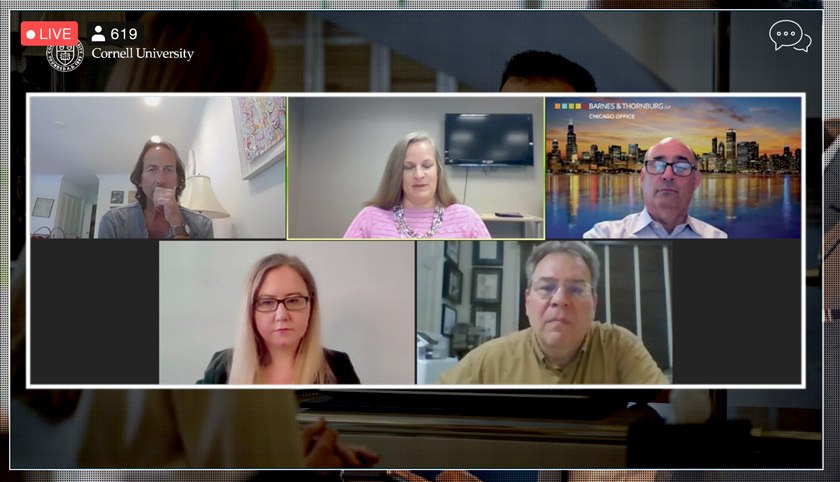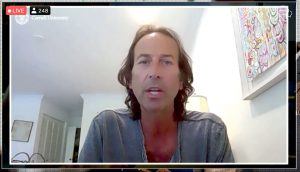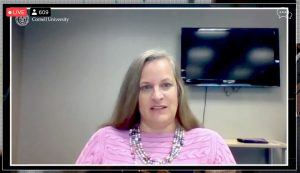More than 900 viewers tuned in on May 4 to hear Cornell alumni and industry experts representing both management and workers discuss whether U.S. employers should require their employees to be vaccinated.
As of May 7, 2021, the Centers for Disease Control and Prevention reported that about 150.4 million people have received at least one dose of a COVID-19 vaccine, which is roughly 57 percent of adults in the U.S. On May 4, President Biden announced a goal to vaccinate 70 percent of adults in the country by July 4.
The live-streamed event, Requiring the COVID-19 Vaccine, was produced by eCornell and Cornell’s Center for Innovative Hospitality Labor and Employment Relations and featured three Cornell alumni: David Sherwyn ’86, JD ’89, John and Melissa Ceriale, Professor of Hospitality Human Resources in the Cornell School of Hotel Administration (SHA); Abigail Charpentier ’95 (SHA), Vice President People and Culture – Americas, Four Seasons Hotels and Resorts; and management-side attorney, David Ritter ’80, Partner, Barnes and Thornburg LLP. Rounding out the panel were plaintiffs’ attorney Christine Hogan, Partner, Wigdor LLC, and union representative John Boardman, Executive Secretary-Treasurer, UNITE HERE, Local 25.
Reaching consensus

Panelists considered the legality of requiring the COVID-19 vaccine, examining both religious and medical precedents for contesting a vaccine mandate. They largely agreed that the current legal climate in the U.S. supports employer vaccine requirements, with reasonable accommodations offered for religious and medical objections.
Looking beyond the legality issue, panelists also discussed the practical and operational implications of various vaccination policies. They shared expert insights on how employers can address health and safety considerations for both clients and workers, and anticipate the potential impacts of their vaccination policies on workplace diversity and culture.
The panelists on both sides of the conversation—from a management and worker perspective—agreed that taking a voluntary approach to vaccinating employees is preferable to a vaccine mandate. Their preferred strategy relies on a combination of education about the safety and efficacy of the vaccines, positive incentives for receiving the vaccine, and measures to make vaccinations easily accessible—such as offering on-site clinics. The experts also agreed on the importance of cultural sensitivity and of considering requests for accommodations on an individual basis.
Starting with the law

David Sherwyn ’86, JD ’89, who moderated the panel, kicked the conversation off by laying out the legal context. “We’ll start with the law,” he said, “since you can’t do something that’s unlawful.”
The governing law for religious objections to vaccination is Title VII of the Civil Rights Act of 1964. This section establishes that, for a religious objection to be legitimate, “all you need is a sincere belief in your religion,” Sherwyn explained.
Yet, existing precedents in religious discrimination cases have not required employers to make substantial accommodations. Rather, employer requirements are what Sherwyn called “De Minimis,” meaning “very little” in Latin. “Employers are not required to do much to accommodate an employee’s belief, even for someone who truly believes in an anti-vaccination religion,” he said.
“We wish the [religious accommodation] standard was more rigorous on employers,” agreed plaintiffs’ attorney Christine Hogan. “Even with the current Supreme Court, I’m not seeing this change anytime soon,” she added.

The legal standard for making a medical accommodation is based on the Americans with Disabilities Act (ADA) of 1990. This act requires employers to make reasonable medical accommodations, unless such accommodation would place “undue hardship” on the employer.
“Employers bear a lot more responsibility with a disability accommodation,” Sherwyn said. He cited a case in which an employee asked for an accommodation to be allowed to work from home. “The 1990s case ruled that it was unreasonable to work from home, but the technology has changed a lot since then,” Sherwyn pointed out.
Attorney David Ritter ’80 said that he is concerned about the time limit on potential medical accommodations to allow an employee to work from home, rather than receive a COVID-19 vaccination.

“My question is when does this end? Maybe this isn’t a permanent work-from-home position,” Ritter said, using an example of a hotel employee who works at the bell desk. “For some positions, like the bell desk, it is an essential function of the job to interact with customers face-to-face.”
Ritter explained that while employers may have valid reasons for mandating vaccines, he views the choice of whether to do so as more of an employee relations decision. “Do you want to make people feel a certain way now, when you could use education versus a sledgehammer?” he asked. “I think you need to do it a different way, but the law says you can mandate it,” he added.
The U.S. Equal Employment Opportunity Commission (EEOC) released an FAQ in December 2020, What You Should Know About COVID-19 and the ADA, the Rehabilitation Act, and Other EEO Laws. This EEOC guidance confirms that employers are legally permitted to require vaccinations, with appropriate accommodations offered.
Leading with education

Abigail Charpentier ’95, an HR professional with the Four Seasons, agreed that the best way to approach the vaccination issue is through education. She said that her company has been focusing on educating their workforce and helping employees to make their own choice.
“We encourage vaccination, to protect people and their families,” she said. “Leaning into that messaging is part of the education,” she added. “How can we work with people bring them along? I want to use all the tools in the arsenal before we take a hardline approach.”
Charpentier said that given scarcity of vaccine supply and distribution issues in different locations, her company can’t apply one standard to their entire global workforce. “There are currently so many challenges globally for requiring vaccines, that we don’t see this as possible,” she said. She explained that the Four Seasons is relying on other safety protocols, such as masking, social distancing, and other public health measures to protect their guests and employees.

Union leader John Boardman agreed that it’s difficult to make one requirement that applies to all employers. As an example, he pointed to the difference between a company where one of 500 employees objects to being vaccinated, versus a company where 75 percent of the workforce objects. “In my experience, it’s not possible to set hard and fast rules for every situation,” he said. “I think we will need to look at each case individually.”
Boardman said that collective bargaining allows each party to make a case. “The employer has an obligation to bargain over this,” he explained, “but they also have an obligation to create a safe workplace for other employees and protect them, as well.”
Finding the path out of this
So far, Boardman said he has not seen significant pushback to vaccinations from union members. “It’s not an unreasonable request,” he said. “We are not finding a huge objection to getting vaccinated—there are not a lot of outliers.” Boardman commended employers for being proactive and offering on-site vaccination clinics to promote a safe workplace.
“I believe that momentum will be created as more and more people get vaccinated and return to work,” he added. “I think there will be the kind of group pressure to ensure that people get vaccinated.”
From a legal standpoint, David Ritter said that employers that require vaccinations are on solid ground. “Yes, you can require it,” he said, noting that more than 100 U.S. colleges and universities have announced COVID-19 vaccination requirements (with accommodations offered) for students prior to the start of the fall 2021 semester. Cornell was among the first universities to inform students of its intentions to require vaccinations.
Looking at the broader employer landscape, Ritter said that he favors education and language that “strongly encourages” vaccinations over a mandate. He cautioned that employers need to weigh practical considerations, especially if there is significant vaccine hesitancy. “I tell employers that part of this is making it easy for employees to get the vaccination at work, right on site,” he said. “You can make it easy. You can give them incentives so they do it willingly.”
Charpentier said that her company has had success with education around requiring employees to wear masks. “Our perspective is that the mask is part of our uniform, that it’s part of the condition of employment and part of the safety of our environment for employees and for our guests,” she said. “I believe we need to continue to educate and encourage as the path out of this,” she added.






